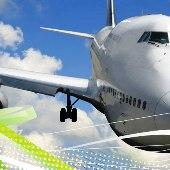 | « Back to article | Print this article |
 The International Air Transport Association that represents 230 airlines across the world, on Tuesday unveiled the 'Checkpoint of the Future', a security model that will do away with intrusive searches at airports and make travel hassle-free.
The International Air Transport Association that represents 230 airlines across the world, on Tuesday unveiled the 'Checkpoint of the Future', a security model that will do away with intrusive searches at airports and make travel hassle-free.
The existing system where all airline passengers, barring VVIPs, have to undergo rigorous frisking, the IATA model proposes different levels of screening for passengers based on the level of risk associated with each one of them.
The classification will be based on intelligence input, behaviour detection and travel data. The model is aimed to make security checks hassle-free for frequent fliers and others posing no security risk.
Air travellers will be screened in the assigned security lanes, according to their risk assessment, using technology that will allow them to walk through the checkpoint without removing clothing or unpacking baggages.
"The system will enhance security while increasing throughput. It is based on positive risk assessment and passengers will be able to go through the checkpoint without breaking stride.
"Most of the technology that will be used is already available. This is science fact not fiction," said IATA's global director for security and travel facilitation Ken Dunlap.
However, the system is unlikely to be implemented in India any time soon. A senior government official said: "IATA has made a presentation to the government.
The International Civil Aviation Organisation has formed a working group which will submit its report next year. India will take a call and formally consider the model based on the ICAO decision. ICAO can either categorise this model as a 'recommended practice' or as 'standard'."
The technology behind this project is either being developed or is available: Behaviour analysis, metal